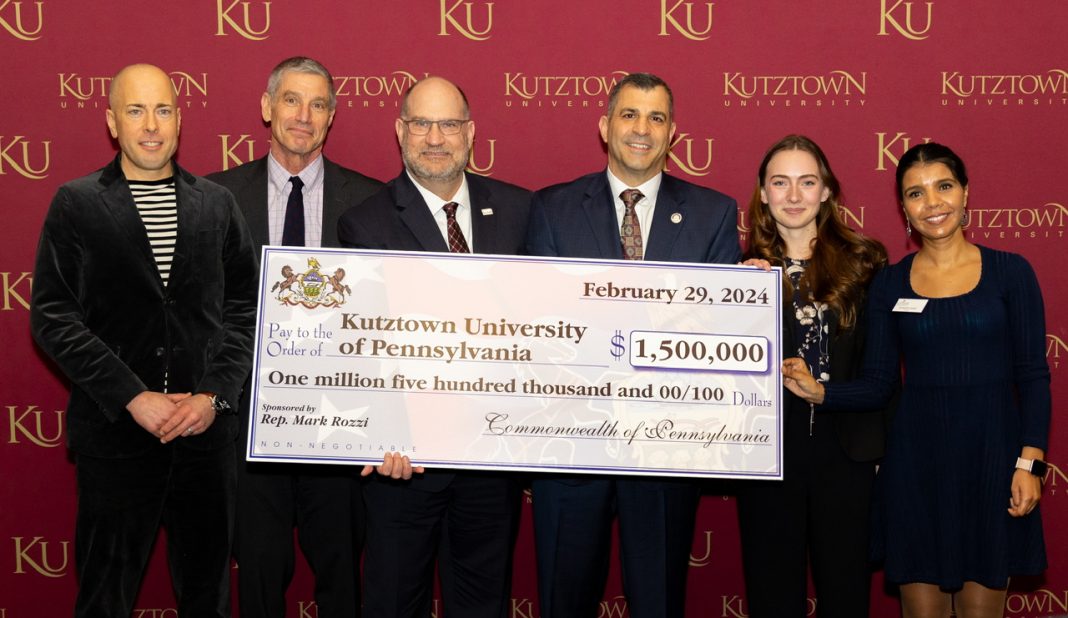Kutztown University was awarded a $1.5 million grant to support its Regenerative Organic Agriculture track within its environmental science program in collaboration with the Rodale Institute. State Representative Mark Rozzi, a 1996 KU graduate, was a pivotal advocate in the university acquiring the grant from the Pennsylvania Department of Community and Economic Development.
Funding will support student scholarships; internships; renovations to the university teaching greenhouse, adjacent to the newly built Nancy Jean Stump Seiger ’54 Botanical Research Center; professional development for students, faculty and Rodale Institute employees; farming equipment and land care.
“This grant will have a significant impact on changing the way food is grown and produced and will provide an important and exciting new career path for our students,” said Dr. Kenneth S. Hawkinson, university president. “We are grateful to Rep. (Mark) Rozzi and the commonwealth of Pennsylvania for their support of Kutztown University in this important work.”
Rozzi was elected to serve as state representative for the 126th Legislative District Nov. 2012. He was then elected by his peers as Speaker of the House Jan. 3, 2023. His legacy lives in the House chamber through the adopted rules he drafted, which he wrote with the intention of improving the legislative process by minimizing instances of hyper-partisanship. Rozzi earned a bachelor’s degree in political science from Kutztown University with a concentration in pre-law and constitutional law.
“I am thrilled to bring this $1.5 million investment to my alma mater,” Rozzi said. “Kutztown had a profound impact on my life, both personally and professionally, and this program has the capacity to do the same for future generations. The regenerative organic agriculture track holds immense promise in reshaping the landscape of agriculture for the better. To be a part of fostering this program and nurturing the relationship between two esteemed institutions, Kutztown University and Rodale Institute, fills me with immense pride and honor. I look forward to the positive impact that future leaders in this growing industry will have on Pennsylvania.”
The Rodale Institute is widely recognized as the global leader in regenerative organic agriculture. KU and the Institute signed a five-year agreement of academic cooperation in 2021, establishing a research affiliation for the mutual benefit of both institutions. The agreement has provided KU students and faculty the opportunity to partner with Rodale Institute personnel and researchers from around the world on field research in the areas of soil health, organic practices for farming and pest management, composting and pollinators.
“Broadening access to the Institute’s in-demand practical scientific research and regenerative organic programming is core to the mission of our Pennsylvania-based global nonprofit,” said Jeff Tkach, Rodale Institute CEO and Kutztown University alumnus. “Through this partnership, Kutztown University students will learn from world-renowned scientists leading research on agricultural methods that enable producers to adapt to extreme weather events, improve the state of regional farming economies and modernize common production methods These skillsets will prepare Kutztown University graduates to lead the nation’s agriculture sector.”
Regenerative organic agriculture focuses on the aggressive restoration of soil health, which involves rebuilding soil carbon stocks. Biological sequestration of carbon in soils is currently one of the most viable practices for reducing atmospheric levels of carbon-dioxide and mitigating anthropogenic climate change. Restoring soil health is also critical to developing functional agricultural ecosystems and ensuring sustainable access to abundant, healthy food for all.
KU’s track in regenerative organic agriculture leverages program strengths in ecology, environmental science and earth systems. The Rodale Institute’s expertise in organic and regenerative agriculture, along with the proximity of the two institutions (six miles), provides students with additional opportunities for creating and researching regenerative organic agricultural systems and principles.
Graduating students will be prepared to serve in many roles in science, governance, certification, community and agriculture as national and global society grapples with the disruptive impacts of anthropogenic climate change and the need to feed the largest human population our planet has ever supported.
To learn more, contact KU’s environmental science program at 484-646-5864 or sewall@kutztown.edu. Learn about the Rodale Institute at rodaleinstitute.org.


